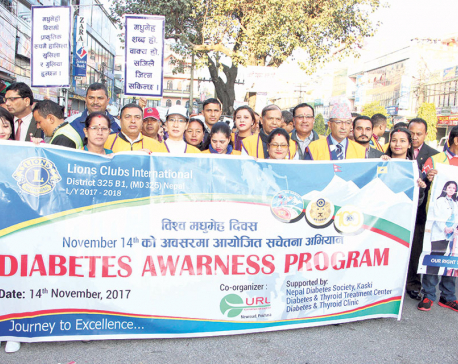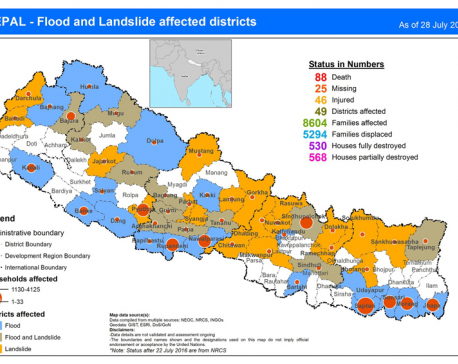
OR
Action against illegal extraction
Now that the government of K P Oli has finally forced transport syndicates and cartels to abide by company act and ensure that they run their businesses competitively and transparently, it must, with equal urgency, take as much strong action against those who are extracting stones, sand and pebbles from various parts of the country, with special focus on preservation of Chure range where such illegal extraction is going on unabated for the past many years. For example, several unnamed and unregistered crusher industries are operating in Chure range in Siraha. As a rule, builders should get their crusher industries registered. Besides, crusher industries must conduct a thorough Environmental Impact Assessment without which they are not allowed to operate plants by the government authorities. Similarly, such industries cannot be established near human settlements or near cultural and heritage sites. Unregistered crusher plants have violated these conditions.
The situation has become so serious that local people have started to take the matters in their own hands. Locals in Siraha district last month forced away crusher industry owners from their area. This could potentially cause conflict and violence between the two. The causes for unabated extraction of Chure are obvious. The government has failed to effectively implement the President Chure Conservation Program that was launched in 2010, while huge money has been spent already for this project. Likewise, there has not been sustained government action against extraction. In 2015, the government had stopped renewing licenses of crushers all over the country citing violation of regulations. In March this year, the government cut off power to 29 stone crushing factories and 62 sand washing plants located along the Prithvi Highway in Dhading for evading taxes and causing pollution in the Trishuli River. Such efforts fail to change the situation due to lack of follow up and sustained action.
We have already started to face the consequences of rampant extraction. Excessive extraction of natural resources has put the fragile Chure range—spanning over 36 districts and accounting for 12.6 percent of country’s total area—on the brink of an environmental disaster. Excessive extraction of sand, boulders and stones are causing desertification. Water sources are drying up, causing great inconvenience to the locals for irrigating the lands and conducting other agriculture related works. The cases of flooding have increased every year and rampant extraction of resources in this region has been ascribed as the cause of massive flooding in the plains. Chure serves as a lifeline to sustain Nepal’s eco-system both up in the hills and the mountains and the areas in the plains. If extraction continues at this rate, a vast majority of people living in the plains will have to suffer the consequence. The Oli government proved its mettle by dismantling transport syndicates and it has been rightly appreciated for this. It has set a good precedent that with one single bold move even the strong nexus of illegal actors can be broken. Similar bold and result-oriented intervention is now required for Chure. Not only our ecology, but the livelihood of millions is at stake.
You May Like This

Save your health to save your wealth
Diabetes is a metabolic disorder which affects other organs of the patients resulting in terminal diseases like heart attack, failure... Read More...

Save the hills to save Nepal
Nepal’s hills and mountains which once captured the imagination of the West as the land of Sangri La stand on... Read More...

How to save your marriage
I’m not a marital expert but it seems that a lot of my friends do come to me for advice... Read More...




Just In
- CM Kandel requests Finance Minister Pun to put Karnali province in priority in upcoming budget
- Australia reduces TR visa age limit and duration as it implements stricter regulations for foreign students
- Govt aims to surpass Rs 10 trillion GDP mark in next five years
- Govt appoints 77 Liaison Officers for mountain climbing management for spring season
- EC decides to permit public vehicles to operate freely on day of by-election
- Fugitive arrested after 26 years
- Indian Potash Ltd secures contract to bring 30,000 tons of urea within 107 days
- CAN adds four players to squad for T20 series against West Indies 'A'














Leave A Comment